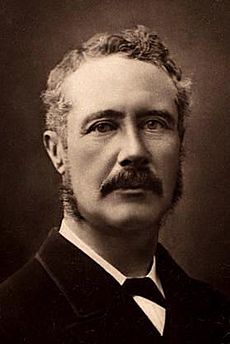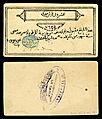Siege of Khartoum currency facts for kids
The Siege of Khartoum currency was special paper money made during a tough time. It was issued by Charles George Gordon, a British general who was the governor of Sudan. This happened when the city of Khartoum was under attack, a period known as the Siege of Khartoum. The money was in units called piastres, and there was even a very large £E50 note. The first of these notes were made on April 25, 1884, and they continued to be produced until November 1884. This kind of money is sometimes called emergency money because it's printed when regular money isn't available.
Background
Charles George Gordon
Charles George Gordon started his military career in 1852 with the Royal Engineers, a part of the British army. He fought in the Crimean War and later in China. In China, he played a big part in stopping the Taiping Rebellion between 1863 and 1864.
After that, he became the Governor of Equatoria (a region in Sudan) from 1872 to 1876. Then, he was made the Governor-General of Sudan from 1877 to 1880. Gordon was asked to be Governor-General again in January 1884. He arrived in Khartoum on February 18, 1884, just under a month before the city was surrounded.
Siege of Khartoum
The Siege of Khartoum was part of a longer conflict called the Mahdist War. This war lasted for 18 years, from 1881 to 1899. It was fought by Muhammad Ahmad, who called himself the Mahdi, against the British Empire (which included Khedivate of Egypt), the Ethiopian Empire, the Congo Free State, and the Kingdom of Italy.
In early March 1884, General Gordon sent messages to the British government. He explained that the Mahdi's forces were blocking roads, stopping supplies, and cutting off telegraph communications. As the fighting got closer to the city walls, and the city was completely surrounded, the siege of Khartoum began. This siege lasted from March 13, 1884, to January 26, 1885.
Gordon asked for more soldiers to help, but his request was denied. Around April 8, 1884, he sent another message saying that he felt free to act on his own. He stated he would hold the city for as long as he could and try to stop the rebellion himself. This difficult situation led to the need for special emergency money.
See also
- Siege money — This is money issued by leaders during other sieges.
Images for kids
 | Sharif Bey |
 | Hale Woodruff |
 | Richmond Barthé |
 | Purvis Young |



